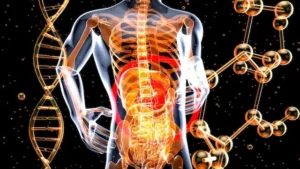Is fatty liver only for fat people?
Fat is also stored in our liver as are many essential substances for the body. But it has a normal level. Accumulation of more fat than normal is called fatty liver. Fatty liver is not a problem for many people but can silently develop diseases like liver cirrhosis in some. Nowadays fatty liver has become a major health problem.
Overweight or obesity is attributed as the main risk or cause of fatty liver. But those who are of normal weight or who are not so fat, can they also have fatty liver?
Body mass index or BMI is the formula for determining whether weight is overweight or underweight according to height. People in the Asian region are considered to have a BMI below 23 as ‘normal’, 23-24 as ‘overweight’ and above 25 as ‘obese’.

People with a BMI below 23, i.e. those who are slim, can also have fatty liver. This rate is around 10-20 percent. It is called in medical language as lean fatty liver.
Causes of Fatty Liver Without Being Obese
- Insulin resistance: The underlying cause of fatty liver is insulin resistance. This insulin resistance is responsible for many diseases including type-2 diabetes, high blood pressure. Insulin resistance is more common in obese individuals but can also occur in normal weight individuals.
- Belly Fat: Many of us have excess belly fat. Normal waist size is 90 cm for men and 80 cm for women. If it is more than that, it is assumed that there is excess fat in the abdomen. People who are not overweight according to BMI, but who have acne, have a higher risk of fatty liver.
- Diet: Eating too much refined sugar, excess carbohydrates and saturated fat can lead to fatty liver.
- Hereditary predisposition: A predisposition to fatty liver has been observed with certain defective genes. Therefore, if the parents have this type of genetic fatty liver, there is a risk of having children too. Despite not being overweight.
How to prevent
- Develop healthy eating habits. It is advised to consume a diet high in fruits and vegetables. Eat moderate carbohydrate foods. Avoid fast food.
- Exercise regularly. Do brisk walking or any exercise at least 5 days a week for 30 minutes. Regular exercise helps reduce insulin resistance.
- Dinner should be eaten early. The habit of going to sleep with a full stomach should be abandoned.
Whether you are overweight or normal, a healthy diet and regular exercise will go a long way in reducing the risk of fatty liver.
What causes fatty liver in thin person?
In an unexpected twist, the phenomenon of fatty liver disease has increasingly become a concern for individuals who might be considered thin or have a seemingly healthy body weight. While traditionally associated with obesity, poor diet, and sedentary lifestyles, thin individuals are not immune to the risk of developing fatty liver. One surprising contributor is a condition known as “skinny fat,” where individuals appear thin on the outside but carry excess fat internally, particularly around the liver.
Combination of Factors
This hidden fat accumulation can result from a combination of factors, including genetics, poor eating habits, high consumption of refined sugars, and a lack of regular physical activity. Even seemingly slender individuals can have an imbalance of fat and muscle, leading to metabolic disturbances and, ultimately, fatty liver disease. This underscores the importance of a holistic approach to health, emphasizing not just body weight but also lifestyle choices and overall metabolic well-being for everyone, regardless of their outward appearance.
Life expectancy with fatty liver disease
Navigating life with fatty liver disease poses a unique set of challenges that intertwine health, resilience, and hope. While the impact of this condition on life expectancy varies from person to person, proactive management can make a significant difference. Adopting a liver-friendly lifestyle, encompassing a balanced diet, regular exercise, and abstaining from excessive alcohol consumption, becomes a cornerstone in defying the odds. Medical advancements, coupled with an increasing awareness of liver health, have paved the way for innovative treatments. As we unravel the complexities of life expectancy with fatty liver disease, it becomes apparent that a proactive and informed approach can empower individuals to not just endure, but thrive, fostering a life that transcends the constraints of the diagnosis.
Fatty liver symptoms in females
In women, recognizing the symptoms of fatty liver disease is crucial for timely intervention and optimal health. While fatty liver symptoms may be subtle in the early stages, vigilant attention to changes in one’s well-being can make a significant difference. Fatigue, often brushed off as a common occurrence, can be an early indicator of fatty liver disease in females. Additionally, unexplained weight loss or a sudden increase in abdominal size should not be ignored.
Persistent Weakness
Women experiencing persistent weakness, along with discomfort in the upper right side of the abdomen, should consider consulting a healthcare professional. These subtle signals may be the body’s way of indicating an underlying issue, and early detection can pave the way for effective management and lifestyle adjustments. Empowering women with knowledge about these symptoms is a crucial step towards promoting liver health and overall well-being.

Is fatty liver dangerous?
The question of whether fatty liver is dangerous underscores the importance of understanding the potential implications of this increasingly prevalent condition. While a mild form of fatty liver, known as hepatic steatosis, may not pose an immediate threat, it can progress to more severe stages, such as non-alcoholic steatohepatitis (NASH), which carries a higher risk. NASH involves inflammation of the liver and can lead to fibrosis, cirrhosis, and even liver failure over time.
Fatty liver
Consequently, the danger lies in the progression of the disease and its potential to cause long-term damage to the liver. It’s crucial to recognize that fatty liver is often associated with lifestyle factors such as poor diet and sedentary habits, making it a condition that can be influenced by positive changes in one’s lifestyle. Education and awareness about the potential dangers of fatty liver serve as powerful tools in motivating individuals to adopt healthier choices and seek medical advice for timely intervention.
How to reduce fatty liver?
In the quest for a healthier lifestyle, addressing the issue of a fatty liver becomes paramount. A multifaceted approach is essential, involving dietary adjustments, regular exercise, and lifestyle modifications. Begin by incorporating liver-friendly foods such as leafy greens, berries, and fatty fish into your meals, while steering clear of excessive sugar and refined carbohydrates. Regular physical activity, even if it’s just a brisk walk, aids in weight management and promotes liver health.
Yoga Practices
Hydration plays a crucial role, so ensure you’re drinking an ample amount of water throughout the day to support liver function. Additionally, consider incorporating green tea into your routine, known for its antioxidant properties that may benefit the liver. Lastly, mindfulness practices like yoga or meditation can help alleviate stress, contributing to an overall improvement in liver health. Small, consistent changes in your lifestyle can make a significant impact on reducing fatty liver and fostering a healthier you.
Can a skinny person have a fatty liver?
While the term ‘fatty liver’ might conjure images of obesity, it’s crucial to dispel the misconception that only overweight individuals are at risk. Surprisingly, even those with a slender physique can fall prey to this silent health issue. Fatty liver disease in lean individuals often goes unnoticed, as their outward appearance may not hint at the internal struggles within their liver. Skinny doesn’t always equate to healthy, and factors such as genetics, diet, and lifestyle choices play a pivotal role. Studies reveal that some thin individuals may have a high percentage of visceral fat, which accumulates around internal organs, including the liver. Therefore, maintaining a healthy weight is not the sole indicator of liver well-being. Understanding the interplay between metabolism, genetics, and lifestyle is essential in recognizing and addressing the prevalence of fatty liver across diverse body types.

Do vegetarians get fatty liver?
While a vegetarian diet is often associated with numerous health benefits, the risk of developing a fatty liver is not entirely exclusive to non-vegetarians. Fatty liver disease is primarily linked to excessive consumption of calories, especially from sugars and fats. Even within a vegetarian lifestyle, choices such as highly processed foods, sugary beverages, and excessive intake of refined carbohydrates can contribute to the accumulation of fat in the liver. It’s crucial for vegetarians to focus on a balanced and whole-foods-based diet, incorporating a variety of fruits, vegetables, whole grains, and plant-based proteins while being mindful of their overall calorie intake. By maintaining a well-rounded and nutritionally sound vegetarian diet, individuals can mitigate the risk of developing a fatty liver and promote overall liver health.
In summary:
While obesity is a major risk factor, fatty liver disease is not exclusive to overweight individuals. Thin individuals can also develop this condition, and various factors, including genetics and lifestyle choices, contribute to its occurrence. Adopting a healthy lifestyle and undergoing regular medical check-ups are crucial for preventing and managing fatty liver disease across different body types.
Dr. Faiz Ahmad Khandkar: Liver and Medicine Specialist, Associate Professor










